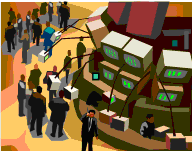| Home | About | Archives | RSS Feed |

@theMarket: Markets Sell in May
 |
The old adage "sell in May and go away" seems to be working this year. In short order all three averages experienced a down draft over the past few days that amounted to about a 5 percent decline in total. Is there more to go on the downside?
If I were a betting man, I would say the odds are in favor of more declines in the weeks ahead. I base that bet on the assumption that it will take at least until the end of June before we get anymore clarity on whether or not President Trump is willing and able to salvage a trade deal with China.
By now, most readers are aware that there has been an abrupt change in expectations on whether or not the tariff trade wars will end anytime soon. Both countries have escalated their rhetoric and at the same time made clear that more tariffs are in the works unless a resolution can be successfully negotiated.
There is a G-20 meeting coming up at the end of June. Reports are that President Trump and his Chinese counterpart, Xi Jinping, will meet at that time. Until then, investors can expect this war of words to continue. Traders will be cocked and ready to pull the trigger on every tweet, comment, or action by either side. I expect markets to respond (up or down) with a vengeance.
At the same time, expect to read and hear how tariffs are bad for worldwide economic growth. The bears will begin warning that Trump's actions towards China will cause the U.S. economy to tip into recession next year. I expect the inverted yield curve will be resurrected and demands that the Fed cut interest rates immediately will likely occupy much of the headlines. And there is some truth to that. As long as a global trade war is a possibility, corporate investment is not likely to rise, nor should it.
We have heard this all before and may hear again in the months ahead. The facts are that while some progress can and most likely will be made in forging a trade agreement with China, the real difficult issues, such as intellectual property safeguards, will take much longer than anyone expects.
One troubling aspect in the president's recent remarks is his willingness to keep tariffs in place, not only in China, but in his negotiations with other countries. We knew when he was elected that there would be a protectionist flavor to his economic policy, but as time goes by his stance has hardened.
The last time the United States actively used tariffs as an economic policy weapon was back in the Thirties. As readers may remember, those policies by us as well as our trading partners ushered in the Great Depression. Could it happen again?
Some argue that the world has changed, and circumstances are different. Protectionism, after years of giving away the shop in trade deals such as NAFTA, is just leveling the playing fields. That may be accurate, but it flies in the face of every economic principal I have studied. If that is truly the endgame here, let's hope it turns out better than the vaunted tax cut that was supposed to supercharge the economy and lead to massive investment in this country.
As the drama continues to play out on a daily basis, look for the markets to remain unsettled. While the ups and downs are nerve-wracking and unpleasant, it's part of a necessary and overdue reset in equity prices. I believe it is temporary and in time will lead to higher prices overall.
Bill Schmick is registered as an investment adviser representative and portfolio manager with Berkshire Money Management (BMM), managing over $400 million for investors in the Berkshires. Bill's forecasts and opinions are purely his own. None of the information presented here should be construed as an endorsement of BMM or a solicitation to become a client of BMM. Direct inquiries to Bill at 1-888-232-6072 (toll free) or email him at Bill@afewdollarsmore.com.

